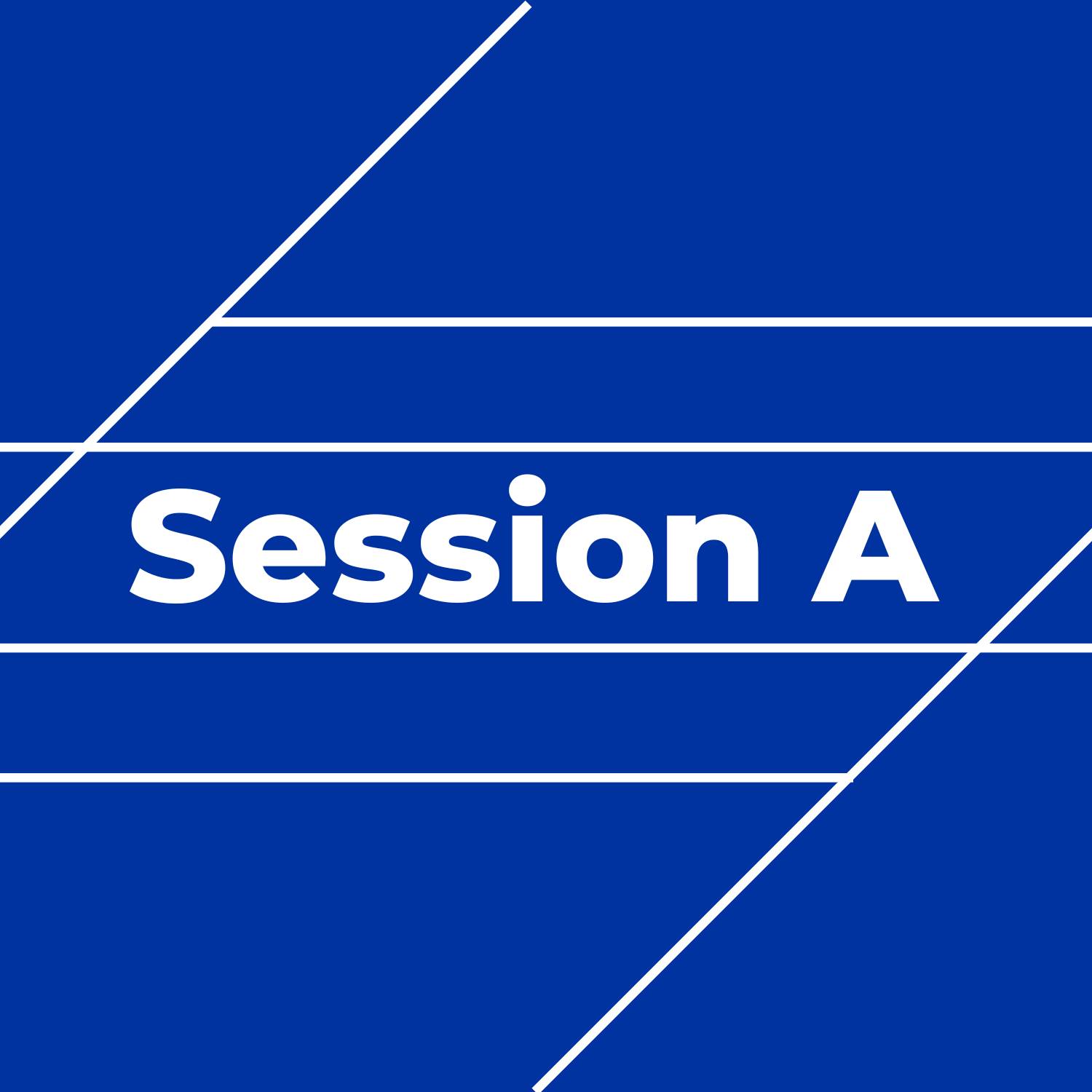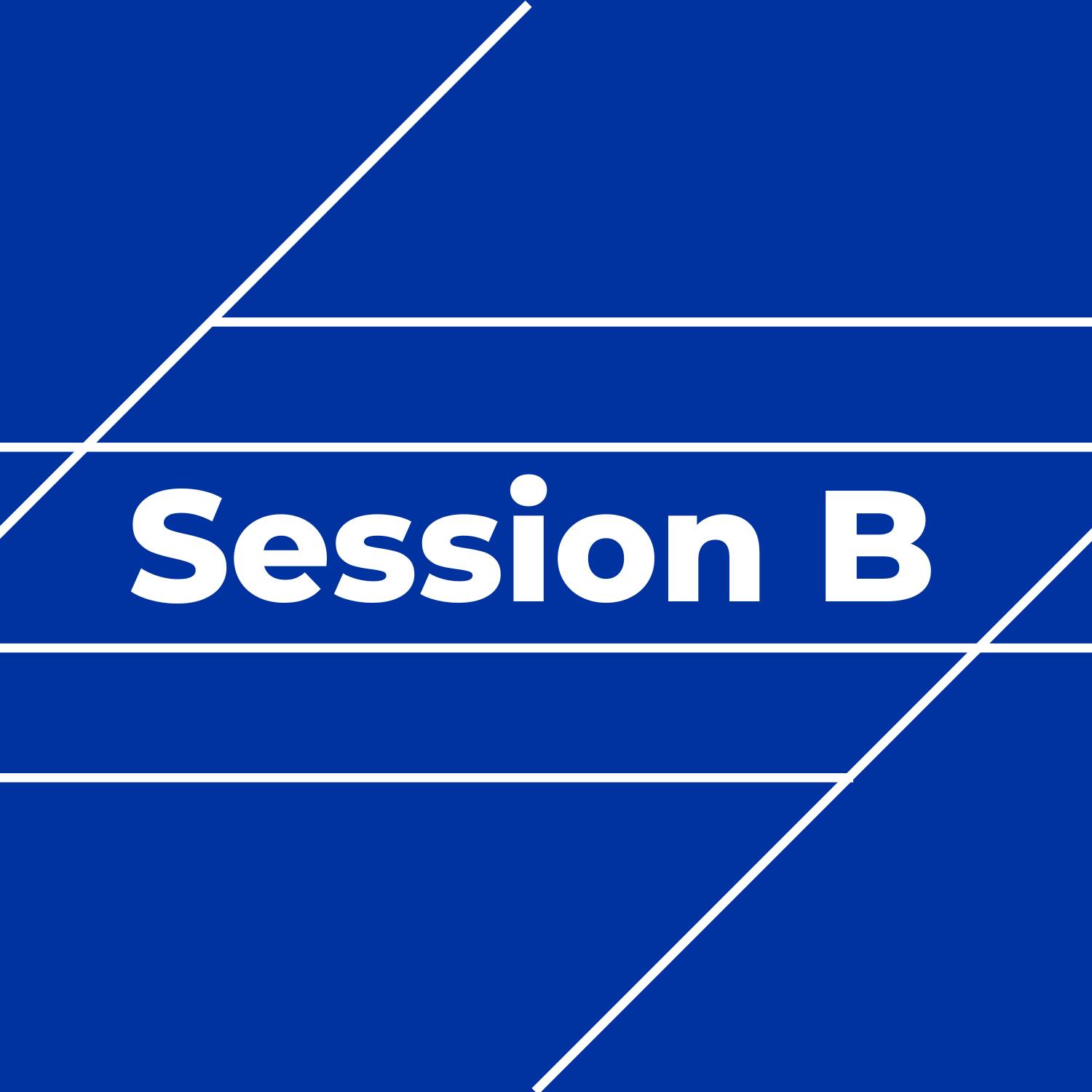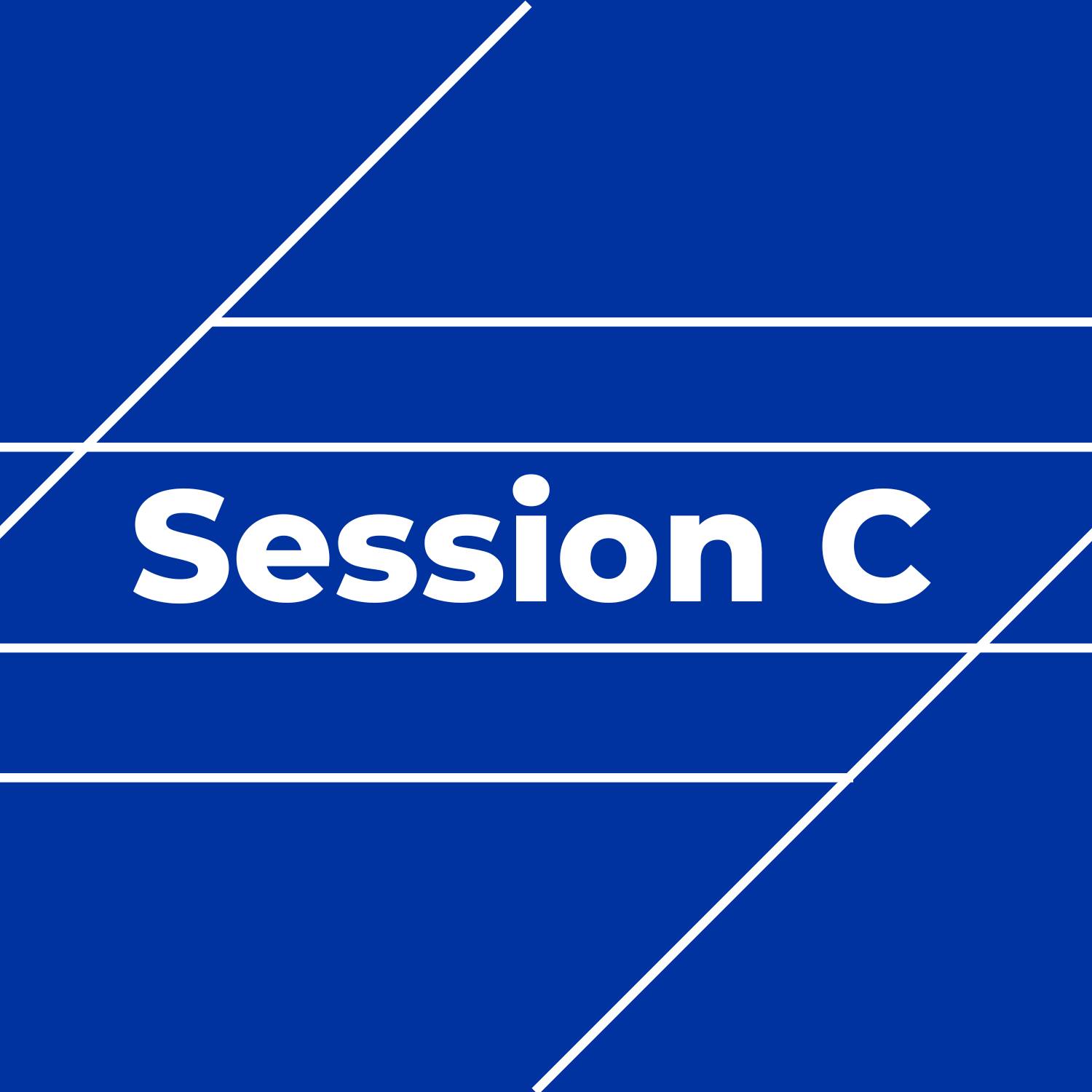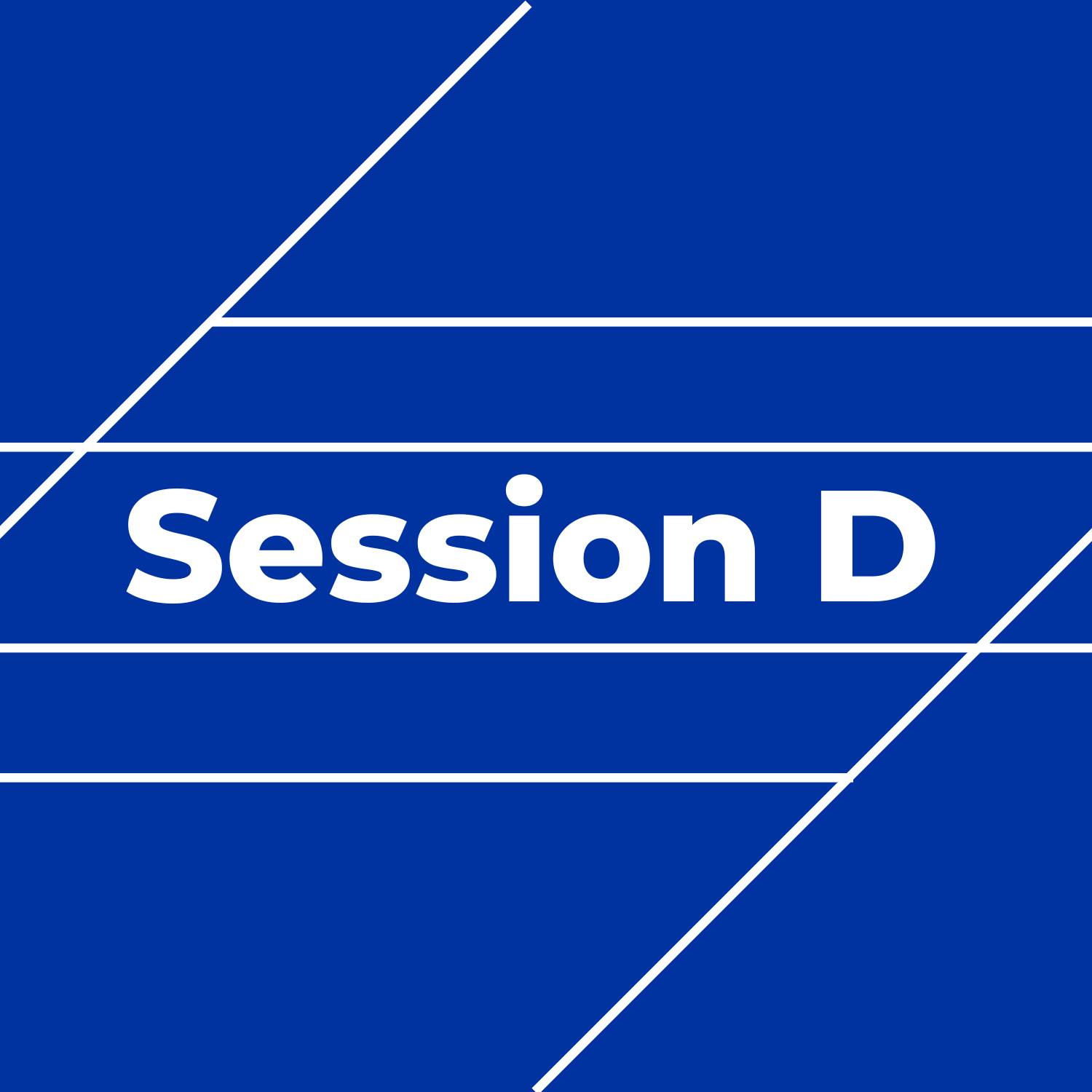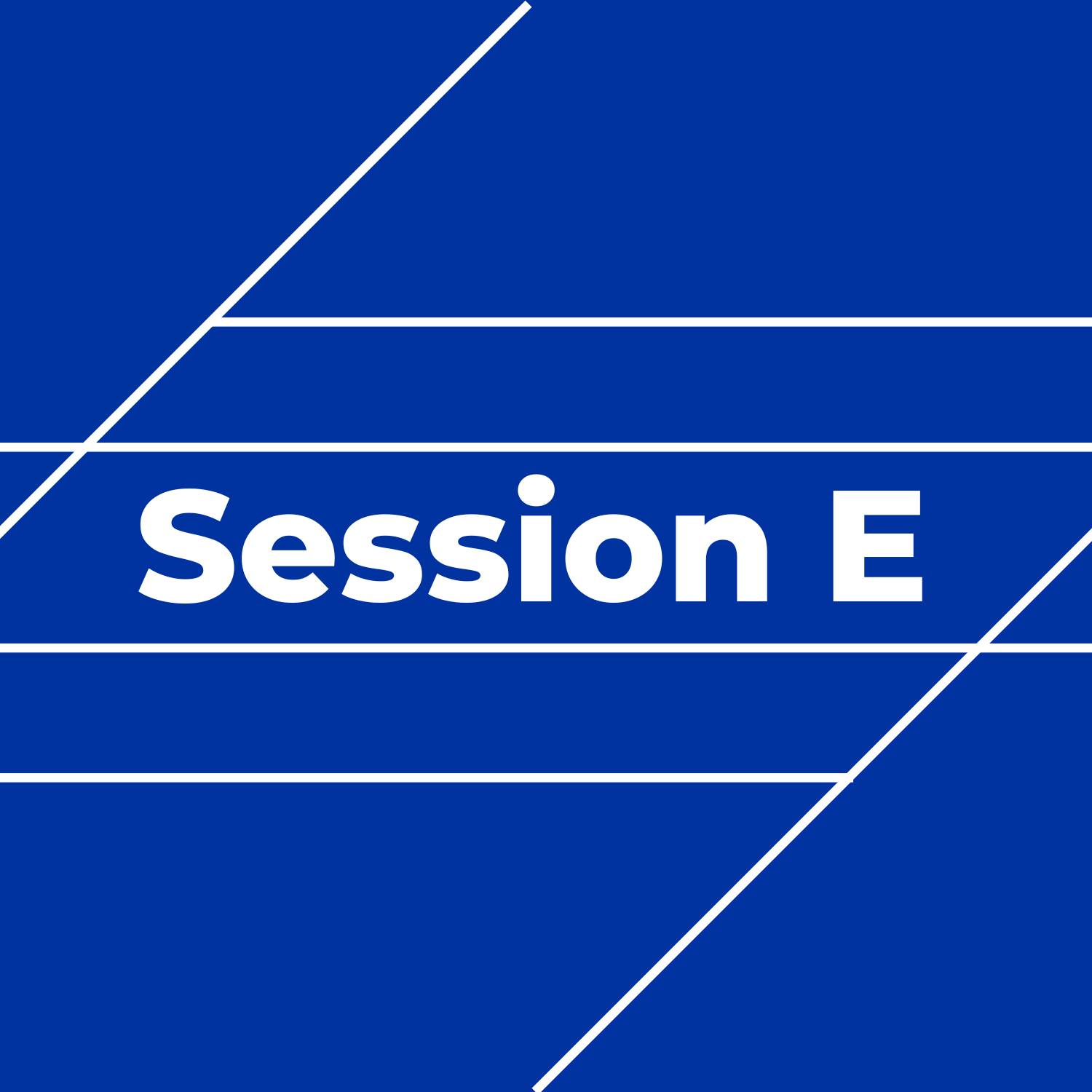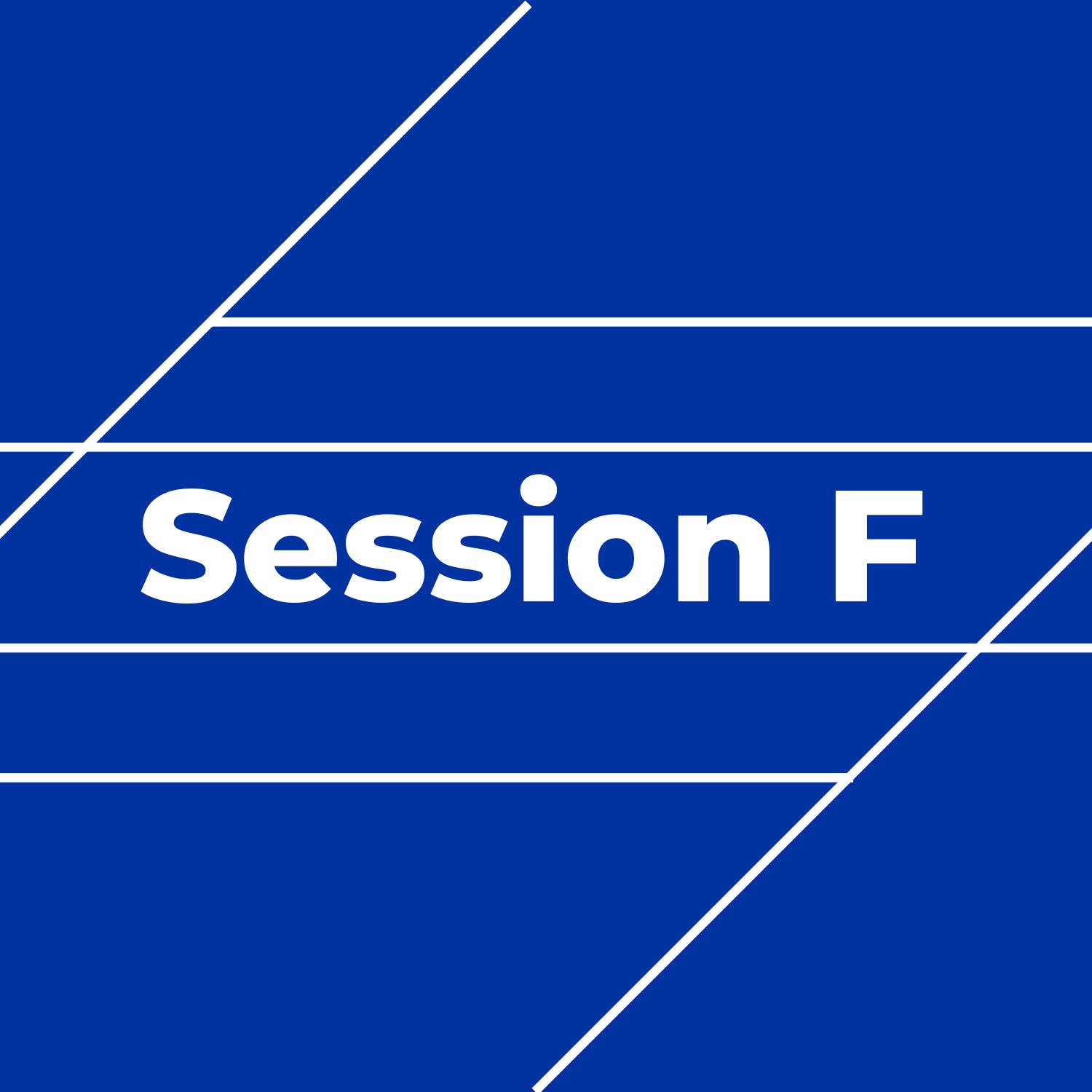Math In Action Conference Program
Welcome to Math in Action!
Dear Colleagues,
Welcome to Math in Action! There are six hour-long sessions with something for every grade level to be found in each. This year we are again excited to offer sessions in multiple modalities. Presentations labeled “online” have a remote speaker, and in-person participants can view these online presentations together in the respective rooms. Presentations labeled “hybrid” have an in-person speaker, and online participants can view these presentations via Zoom. Presentations labeled "in-person" have an in-person speaker and are only available to in-person participants.
We are especially excited to welcome our keynote speaker, Jenna Laib, who will give three presentations during Sessions C, E, and F.
You should find a meal ticket behind your nametag badge. You may choose to enjoy brunch during Session C, or lunch during Sessions D or E. If you have any questions, please find us at the registration table.
Please fill out evaluations for each presenter using the link at the top of the page.
Sincerely,
The Math in Action Steering Committee
SCECHs
We will be logging SCECHs electronically this year. After each presentation, the MIA volunteer in that room will have a QR code for you to scan (or a link) for you to log your attendance. You will need to do this for each presentation you attend. Please remember that you can earn up to 5 SCECHs for attending Math in Action (you must attend Brunch or one of the Lunch times - you cannot skip to get more SCECH credit). Please make sure you have your PIC number handy the day of the conference.
Session Evaluations
Please evaluate each session that you attend! Go to
https://www.gvsu.edu/mathinaction/eval
to complete all session evaluations.
Wifi and Presenter files
Wifi login: Join “GV-Visitor” and accept the terms. No password is needed.
Presenter files will be available at this link: 2024 conference files.
Maps, parking, and meals
The maps below show parking, the conference location, and the meal location. You can also find these on the Allendale campus map.
- Parking: Parking is open at GVSU on weekends. No permit is needed. We suggest that you park in Lot C1 to be as close as possible to the conference. In case of full parking, lots D, E, F, and G are also available.
- Conference location: The conference is held in Mackinac Hall's D wing. The closest entrance to the parking area is marked by a tall yellow sculpture. Mackinac Hall is located at J7 on the Allendale campus map.
- Keynote location: Keynote sessions are held in Manitou hall, which is directly connected to Mackinac Hall. Signs will be posted to help you navigate!
- Brunch / Lunch: Meals will be in The Dish in Kleiner Commons, located at K4 on the Allendale campus map.
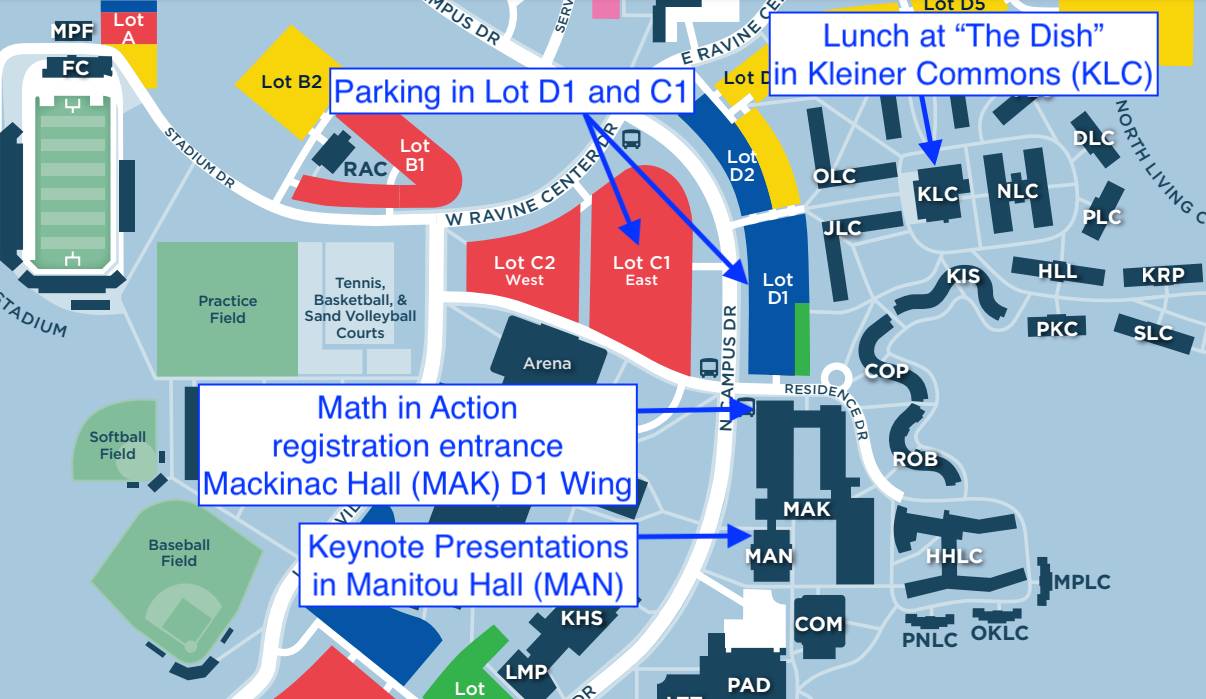
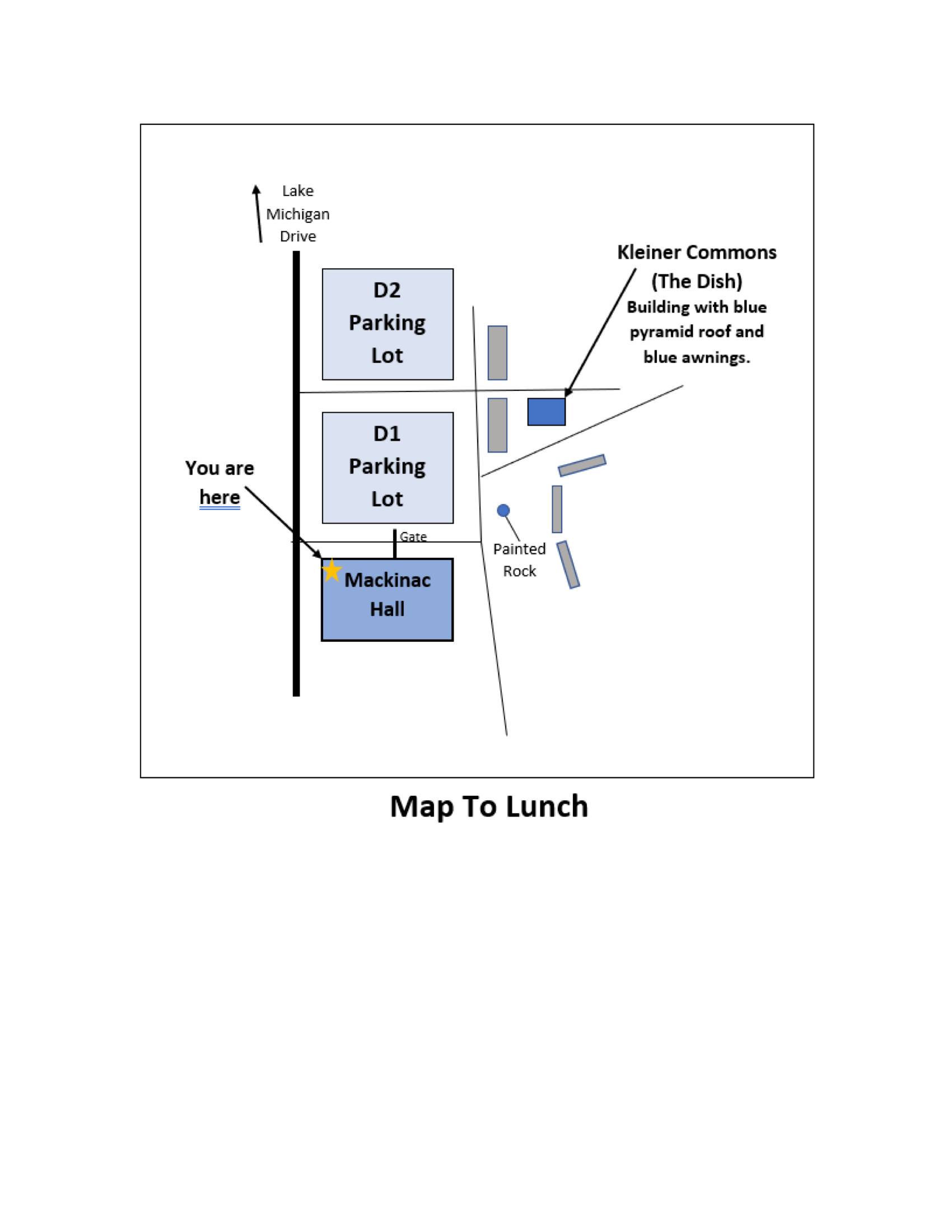
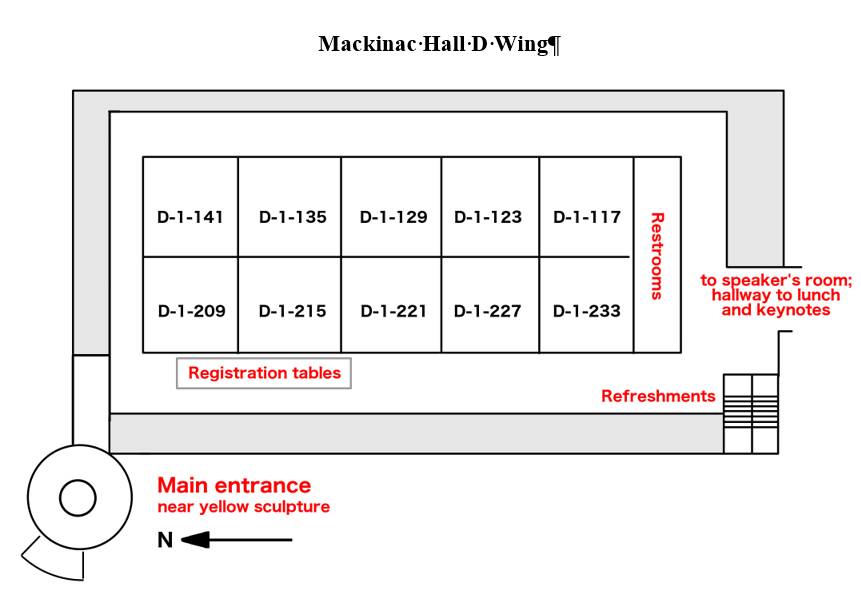
Schedule of Presentations
Session A 8:40-9:40
|
Session |
Room |
Modality |
Grade |
Session Description |
|---|---|---|---|---|
|
A1 |
D-1-209 |
In-person |
PreK-2 |
Rekenrek - The Most Powerful Math Tool! Adrianne Houser and Holly Ashley, Grandville Public Schools Learn about the amazing math tool called the Rekenrek (math rack). This powerful tool helps solidify number sense and operations. This hands-on session includes the opportunity to learn various routines with the tool and how to make one. |
|
A2 |
D-1-215 |
In-person |
3-5 |
A Meaningful Path to Lasting Multiplication Fact Fluency Gina Kling, Aubree Folkert and Kathryn Kemp, Hope College In this session, we will unpack the meaning of fluency and examine a trajectory for how students master their facts. Come explore how to use visual imagery, games, and formative assessment strategies to help students develop lasting multiplication fact fluency. |
|
A3 |
D-1-221 |
In-person |
6-8 |
Bite-Sized Inquiry Sasha Rudow, Michigan State University When teachers hear "inquiry-based learning" they think they have to overhaul their entire curriculum. Instead, make some small changes and still have a big impact! |
|
A4 |
D-1-227 |
Hybrid |
9-12 |
37 Favorites David Sladkey, Naperville Community School District 203 IL This is my 37th year teaching and my last. I'm savoring it and want to share 37 of my favorite math teaching ideas with you. Participants should bring phones or tablets. |
|
A5 |
D-1-117 |
In-person |
6-12 |
Scenario-based Units and Lessons Paul Yu, Grand Valley State University Situated somewhere between real-world context problems and project-based learning, Scenario-based instruction uses a real world scenario that is engaging and meaningful for learners of mathematics. The purpose of the scenario is to engage the students in a situation based on ‘an experience’ in order to draw out their own mathematical wondering and intuitions, in order to support the unit of instruction. This session will high light the distinction between scenario-based instruction verses real world and project-based learning by giving concrete examples that have been used in the classroom. |
Session B 9:50-10:50
|
Session |
Room |
Modality |
Grade |
Session Description |
|---|---|---|---|---|
|
B1 |
D-1-209 |
In-person |
PreK-2 |
Building Number Sense Rachel Tabron and Carlos Sosa, Alt+Shift This presentation will focus on using manipulatives and the Concrete-Representional-Abstract Method to build number sense in all students. |
|
B2 |
D-1-215 |
In-person |
3-5 |
Math Play Activities Grades 3-5 Monica Bliss, Grand Rapids Community College Pre-service elementary teachers from Grand Rapids Community College will present activities that encourage Math Play in the classroom or at home. Be ready to play! Topics may include geometry, multiplication/division, fractions, and decimals. |
|
B3 |
D-1-221 |
In-person |
3-8 |
Co-teaching and Math Workshop in the Upper El and Middle School Math Classroom Sara Billin and Mikayla Miedema, Hudsonville Christian School This session will review co-teaching models and show how station teaching with two educators works well for differentiation and inclusion. Learn how you can make the most of having a special ed teacher or another educator in your math classroom! |
|
B4 |
D-1-227 |
Hybrid |
9-12 |
10 things about math teaching I wish I knew 10 years ago Zach Cresswell, Mt. Pleasant Public School You'll save a decade and share some workable wisdom! This interactive, fast-paced, session features loads of practical advice you can use Monday; from pertinent pedagogy, to whiteboarding, to no-nonsense time-savers. Targeted towards young teachers, with experienced teachers in mind! Participants should bring phones or tablets. |
|
B5 |
D-1-117 |
In-person |
9-12 |
Editing and Customizing Desmos Activities Andy Malbouef, Whitehall District Schools Teachers who've become familiar with Desmos activities will at some point want to customize existing activities. This session begins having teachers experience simple editing shortcuts, and ends with them creating custom activities from scratch utilizing various engaging components. Participants will need laptops. |
|
B6 |
D-1-233 |
Online |
6-8 |
Free Open Digital Math Support Resources For Grades 4-8? Yes! Monique Zhou, GeoGebra GeoGebra has created free open digitally interactive math resources for every math skill of grades 4-8. Supporting current engagement theories, many include elements of gamification, and are student centered and discovery-based. All can be used for instruction, exploration, or practice. |
Session C 11:00-12:00 Brunch
|
Session |
Room |
Modality |
Grade |
Session Description |
|---|---|---|---|---|
|
C0 |
MAN 102 |
Hybrid |
Elementary Keynote |
Developing and Nurturing Data Literacy: Using Slow Reveal Graphs to Empower K-5 Students Jenna Laib Graphs and infographics are everywhere! How can we help our students navigate the vast data landscape that they encounter? We will explore a discourse-driven instructional routine called Slow Reveal Graphs. This highly engaging routine uses scaffolded visuals to help students make sense of data. As more and more of the graph is revealed, students refine their interpretation and construct meaning, often in surprising ways. This routine increases access for students without sacrificing mathematical rigor or engagement. |
|
C3 |
D-1-221 |
In person |
6-12 |
The Synergy between NCTM's Orchestrating Productive Discussions framework with Complex Instruction Jon Hasenbank, Logyn Miller and Josiah Kruithof, Grand Valley State University Learn how integrating NCTM's Orchestrating Discussions framework with Complex Instruction can lead to rich student interactions and increase engagement. Leave with practical techniques for group work that reduce inequities, promote discourse, and deepen understanding. Examples from rigid transformations and more. |
|
C4 |
D-1-227 |
In-person |
9-12 |
Using Graphic Novels in the Middle and High School Mathematics Classroom David Klanderman and Sarah Klanderman, Calvin University Join us to explore ways to use a variety of graphic novels in your mathematics teaching to enhance learning, excite students to dig deeper, and enrich understanding of mathematical concepts through the interplay of text and image. Participants should bring phones or tablets. |
|
C5 |
D-1-117 |
Hybrid |
PreK-12 |
Can They Afford It? Tami Bailey and Bethany Welling, Grand Valley State University Our presentation will discuss what Open Educational Resources (OER) are and how they can help make education more affordable, accessible, and can improve student engagement. Participants will need a laptop. |
|
C6 |
D-1-233 |
Online |
9-12 |
Using GeoGebra to Represent, Model, and Solve Problems Jose Contreras, Ball State University Participants will use GeoGebra to represent, model, and solve two classic problems: The buried treasure problem and the picnic or Viviani's problem. We will discuss and justify some of the conjectures suggested by GeoGebra via mathematical proof. |
Session D 12:10-1:10 Lunch
|
Session |
Room |
Modality |
Grade |
Session Description |
|---|---|---|---|---|
|
D1 |
D-1-209 |
In-person |
PreK-2 |
Joyful Math - Play With a Purpose Kathryn Coffey and Dave Coffey, Grand Valley State University Reignite joy in your teaching and in your classroom! In this interactive session, participants will play simple engaging, yet challenging games that promote the development of children's number sense and mathematical mindsets. This presentation was moved from Session E in a previous version of the schedule. |
|
D2 |
D-1-215 |
In-person |
3-5 |
Engaging Elementary Students with Desmos Activities Andy Malbouef, Whitehall District Schools This session will explore Desmos activities from an elementary perspective, and allow elementary teachers to experience first-hand the opportunity for student engagement and interaction in the classroom. We will explore activities at three different grade levels. Join us! Participants will need laptops. |
|
D3 |
D-1-221 |
In-person |
6-8 |
Building Thinking Classrooms with Underprepared 6th Graders" OR "Intervention at Every Level Nick Smith, Glen Lake Community Schools I started the year with only 25% of my students "ready" for 6th grade. Is this accurate? Can I get them "ready" for 7th grade? Learn from all my failures and hopefully some success on Building Thinking Classrooms! |
|
D4 |
D-1-227 |
Hybrid |
9-12 |
Introducing Equity Issues in an Algebra class Firas Hindeleh, Grand Valley State University In this talk, I will share a linear functions activity where students get to reflect on equity issues while modeling a linear system. Participants will brainstorm other ways to introduce equity and inclusion topics in their algebra classes. |
|
D6 |
D-1-233 |
Online |
6-8 |
Math-ers of the Heart Demetrius Nelson, Cobb County School District The mathematical focus of this presentation will be the power of relevancy in mathematics and how it can fuel longevity in this career. Participants will gain an understanding of how math has been detrimental or a developer for students. |
|
--- |
--- |
--- |
--- |
Canceled: A Transformative Approach for Creating an Inclusive Mathematics Culture This session has been canceled. |
|
--- |
--- |
--- |
--- |
Canceled: The power of exploration in math This session has been canceled |
Session E 1:20-2:20 Lunch
|
Session |
Room |
Modality |
Grade |
Session Description |
|---|---|---|---|---|
|
E0 |
MAN 102 |
Hybrid |
Secondary Keynote |
Developing and Nurturing Data Literacy: Using Slow Reveal Graphs to Empower Students in Grades 6-12 Jenna Laib Graphs and infographics are everywhere! How can we help our students navigate the vast data landscape that they encounter? We will explore a discourse-driven instructional routine called Slow Reveal Graphs. This highly engaging routine uses scaffolded visuals to help students make sense of data. As more and more of the graph is revealed, students refine their interpretation and construct meaning, often in surprising ways. This routine increases access for students without sacrificing mathematical rigor or engagement. |
|
E1 |
D-1-209 |
In-person |
PreK-2 |
1...2...3...Subitize Me! Developing and Reinforcing Number Sense and Numeration in Students Carlos Sosa and Rachel Tabron, Alt+Shift Participants will dive into the concept of subitizing! Subitizing helps students recognize numerical quantities and develop efficiency in their learning of numbers. Participants will learn types of subitizing, review evidence-based classroom applications, and discover next-day implementation strategies for all learners! Participants should bring phones or tablets. |
|
E3 |
D-1-221 |
In-person |
3-5 |
Micro-Learning: A new form of professional learning Marcus Deja, Sammi TenHave, and Kelli VanSetters, Kent ISD How do I get my kids engaged? How do I facilitate class discussions? These common questions are addressed in a newly designed professional learning format called micro-learning. This session will share the format and content to support teachers. Participants will need laptops. |
|
E6 |
D-1-233 |
Online |
6-12 |
Posing and Solving Problems about Consecutive Integers Jose Contreras, Ball State University and Armando Martinez-Cruz, Cal State Fullerton Participants will pose and solve problems about consecutive integers. We will start with a simple but rich problem: What can be said about the sum of three consecutive integers? Participants will then pose and solve related problems, including converse problems. |
Session F 2:30-3:30
|
Session |
Room |
Modality |
Grade |
Session Description |
|---|---|---|---|---|
|
F0 |
MAN 102 |
In-person |
All |
Continuing the conversation Jenna Laib Join our keynote speaker for an informal discussion that continues the themes of her keynote. Bring questions! |
|
F1 |
D-1-209 |
In-person |
PreK-2 |
Math Play Activities PreK-2 Monica Bliss, Grand Rapids Community College Pre-service elementary teachers from Grand Rapids Community College will present activities that encourage Math Play in the classroom or at home. Be ready to play! Topics may include geometry, addition, and subtraction. |
|
F2 |
D-1-215 |
In-person |
3-5 |
Tools, Models, and Numbers: Supporting Conceptual Understanding Kelli VanSetters, Sammi TenHave, and Marcus Deja, Kent ISD In this session participants will explore mathematical tools, models, and strategies. We will engage in dialogue around how best to support our students conceptual understanding while living within our Tier 1 resource. |
|
F3 |
D-1-221 |
In-person |
6-8 |
Math Recovery Style Instruction for Students with IEPs: A Case Study Karl Schantz, Cedar Springs Public Schools This presentation will focus on my current and ongoing work with several students with IEPs in middle level grades. I will highlight the systematic approach I am taking to fill their "conceptual holes" using Math Recovery style teaching. |
|
F4 |
D-1-227 |
In-person |
9-12 |
Kellogg's® Math In Action Video Series - Snack Mix Kent Higgs, Math Nation |
|
F6 |
D-1-233 |
Online |
PreK-12 |
Teaching in Alignment Honora Wall, EduCalc Learning Are your teaching practices in alignment with your personal goals? It's easy to be distracted, overwhelmed, and out of alignment, which undermines student achievement and our physical and mental health. This interactive session gets you in alignment for success! |
Thank you!
- Presenters: We appreciate your preparation, expertise, time, and consideration. Thank you for your high level of engagement in mathematics education and for sharing that expertise in enlightening us!
- Participants: Thank you for your curiosity, dedication, and interest in your own learning and that of your students. Your participation today says a lot about you and is most appreciated.
- Ana Vanbragt (GVSU Department of Mathematics): Thank you for jumping in and helping with all the details, no matter how big or small; the facilities, registration, arrangements for refreshments, meals, tables, Math in Action swag, and a million others. Without you behind the scenes, there would be no conference!
- Shelly Micho (Regional Math and Science Center): Thank you for taking care of the advertising, programs, signage, and many other details. Without you and Ana VanBragt there would be no conference.
- Steering Committee: Your work in determining the experts to address major issues and mathematical concepts, contacting speakers, organizing the program, advertising, and volunteering during the day of the conference provide an enriching experience for all of us. Thank you for your many hours of thoughtful dedication.
- Volunteers: Making certain that everything goes smoothly on the day of the conferences in every session, helping speakers carry and distribute materials, orienting participants to the environment, and all the other things you do to support the conference is greatly appreciated!
Sincerely,
David Clark and Joy Oslund
Math in Action GVSU Co-Chairs
Math in Action Steering Committee Members
Julie Clark, Jenison Public Schools
John Golden, Grand Valley State University
Tara Maynard, Zeeland Creekside Middle School
Shari McCarty, Aquinas College
Shelly Micho, Regional Math & Science Center
Chelsea Ridge, Regional Math & Science Center
Taylor Short, Grand Valley State University
Ana Vanbragt, GVSU Site Director
Paul Yu, Grand Valley State University
Thank you to our generous sponsors!


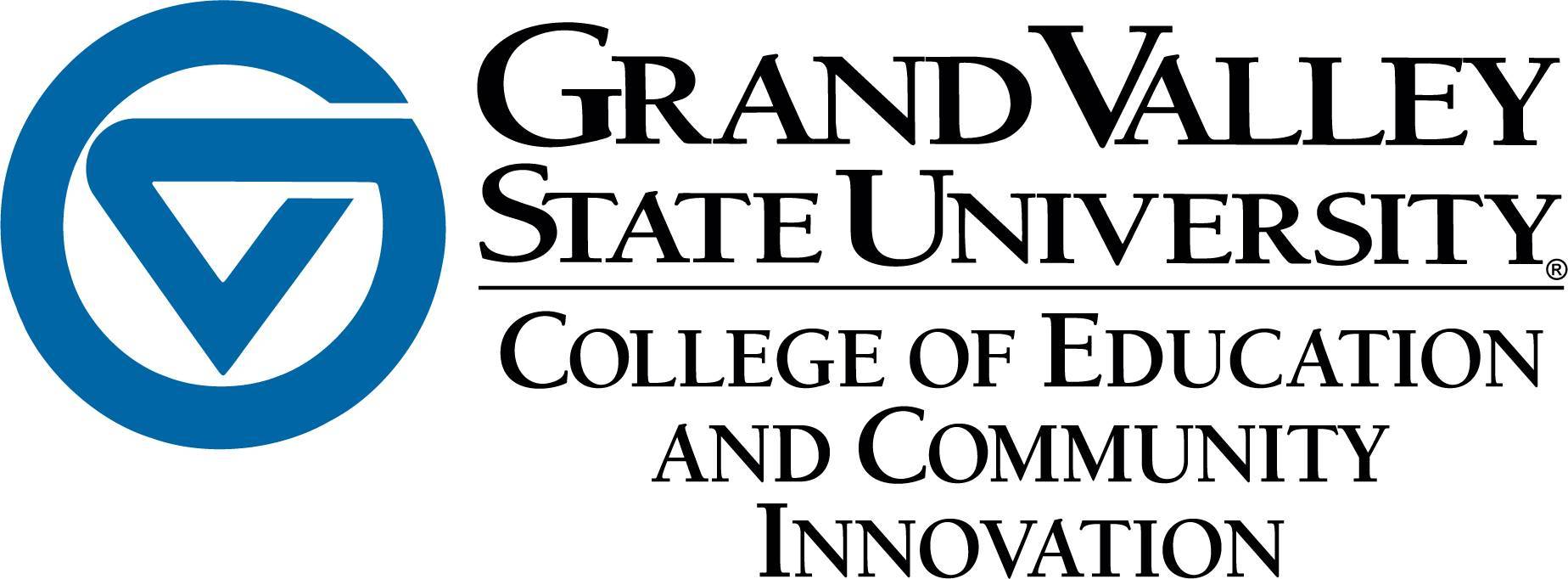

[1675942789].jpg)

